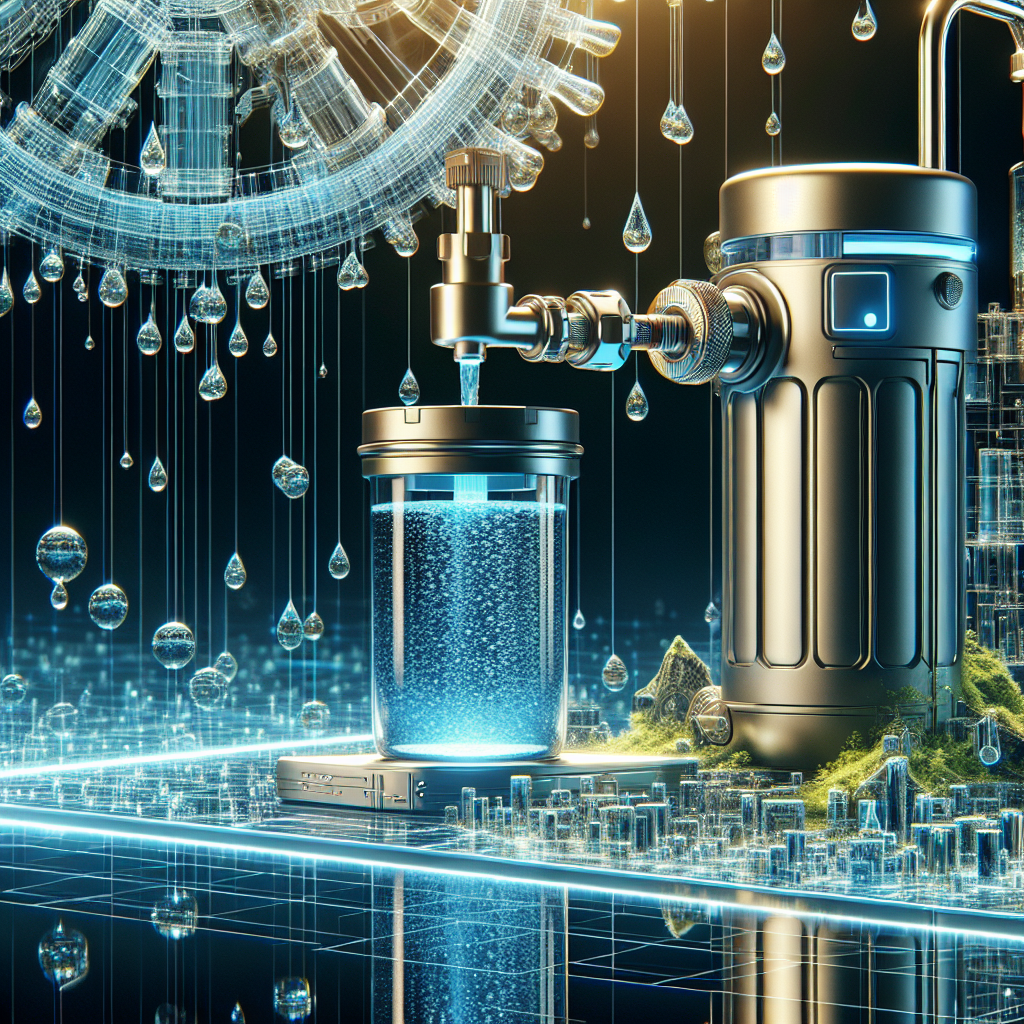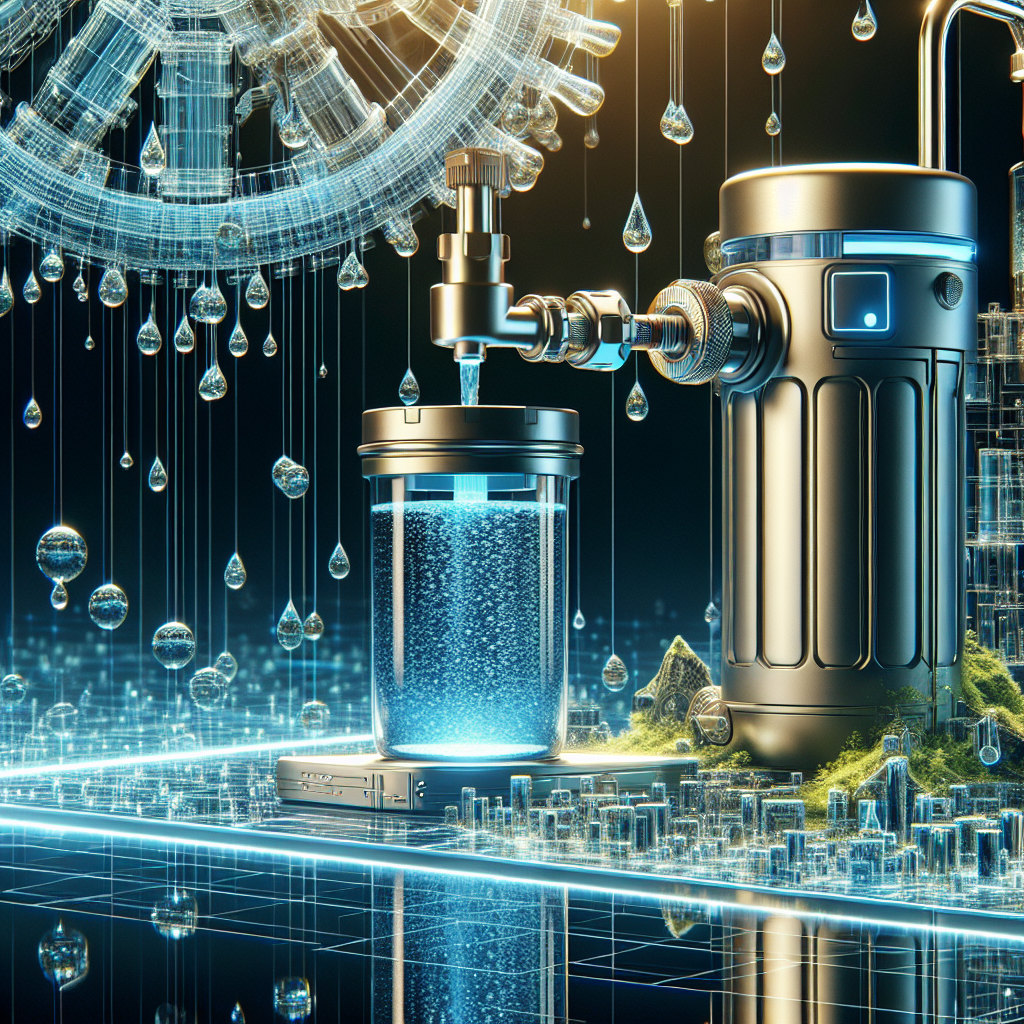Are you curious about the latest advancements in water filtration systems? Wondering how you can ensure that the water you and your loved ones consume is pure and safe? Look no further! In this article, we will explore the newest trends in water filtration systems, providing you with valuable insights and information to help you make an informed decision. From cutting-edge technologies to eco-friendly solutions, we have got you covered. So, let’s dive in and discover the exciting world of water filtration!
Advanced filtration technologies
Reverse osmosis
Reverse osmosis is a highly effective method of water filtration that is widely used in residential and commercial settings. It involves forcing water through a semipermeable membrane to remove impurities, contaminants, and minerals. This process can effectively remove up to 99% of pollutants, such as heavy metals, chlorine, and bacteria. Reverse osmosis systems are known for their ability to produce clean and great-tasting water.
Activated carbon filters
Activated carbon filters are another popular filtration technology due to their ability to remove a wide range of contaminants, including chlorine, pesticides, herbicides, and volatile organic compounds (VOCs). These filters work by trapping and adsorbing these impurities onto the activated carbon surface. Activated carbon filters are known for their ability to improve water taste and odor while removing harmful substances.
Ultraviolet (UV) light filtration
UV light filtration systems utilize powerful UV lamps to disinfect water by deactivating harmful microorganisms such as bacteria, viruses, and parasites. By exposing water to UV light, these systems inhibit the organisms’ ability to reproduce, effectively eliminating them from the water. UV light filtration is a chemical-free method that provides efficient disinfection, making it an ideal solution for households concerned about waterborne pathogens.
Electrodeionization
Electrodeionization (EDI) is an advanced technology that combines the principles of ion exchange and electrochemistry to produce ultrapure water. EDI systems use ion-exchange membranes and electric currents to remove ions, dissolved minerals, and remaining impurities from the water. This process provides a continuous supply of high-quality purified water, making it popular in industries such as pharmaceutical manufacturing, power generation, and semiconductor production.
Smart features and IoT connectivity
Monitoring and alerts
One of the latest trends in water filtration systems is the integration of smart features and Internet of Things (IoT) connectivity. With these advancements, users can now monitor their filter’s performance and water quality in real-time through smartphone apps and other connected devices. Alerts can be sent to notify users of any issues that require attention, ensuring optimal filtration efficiency and providing peace of mind.
Automatic shut-off
Water filtration systems with automatic shut-off features offer an added layer of convenience and protection. These systems are equipped with sensors that detect when the filter’s lifespan is exhausted or if there are any malfunctions. When a problem is detected, the system automatically shuts off the water supply to prevent the usage of contaminated water or filter failure.
Filter replacement reminders
Keeping track of filter replacement schedules can be challenging, but with the advent of smart filtration systems, this task has become much easier. Many advanced filters now come with a filter replacement reminder feature that utilizes technology and sensors to track filter usage and notify users when it’s time for a replacement. This ensures that the filters are changed at the appropriate intervals, guaranteeing optimal performance and water quality.
Self-cleaning systems
Backwash systems
One of the most significant advancements in water filtration technology is the development of self-cleaning systems, such as backwash filtration. These systems use a process called backwashing, where the flow of water is reversed to flush out accumulated debris and contaminants from the filter media. This automated cleaning mechanism ensures that the filters remain effective and efficient over an extended period, reducing the need for manual maintenance.
Membrane cleaning mechanisms
Filtration systems that utilize membranes, such as reverse osmosis, also incorporate self-cleaning mechanisms to prolong their lifespan and maintain optimal performance. Membrane cleaning processes may involve periodic flushing, chemical cleaning, or even advanced technologies such as ultrasonic cleaning. These cleaning mechanisms help to remove fouling and extend the life of the membranes, resulting in more efficient filtration and improved water quality.

Portable and on-the-go solutions
Personal water bottles with filters
For those who are constantly on the move or enjoy outdoor activities, portable water bottles with built-in filters have become a popular solution. These bottles feature compact filtration systems that effectively remove contaminants, allowing you to enjoy clean and safe drinking water wherever you go. Portable water bottles with filters provide convenience, especially in areas where access to clean water may be limited or uncertain.
Gravity-fed portable filters
Gravity-fed portable filters offer a simple and efficient way to purify water without the need for electricity or complicated installation. These systems typically consist of a filtration unit that uses gravity to draw water through various filtering stages, including activated carbon and ceramic filters. The gravity-fed design makes them ideal for camping, hiking, or emergency situations, where access to clean water is crucial.
Portable UV purifiers
Portable UV purifiers provide a compact and convenient method of water sterilization. These devices use UV light to destroy harmful microorganisms, providing instant disinfection. Portable UV purifiers are lightweight, easy to use, and do not require any additional chemicals. They are an excellent option for travelers or individuals who need a reliable water purification solution on the go.
Alkaline water filtration
Ionization process
Alkaline water filtration systems utilize an ionization process to increase the water’s pH level, making it more alkaline. These systems typically incorporate a process called electrolysis, where water passes through electrodes that ionize it by separating it into acidic and alkaline components. The alkaline water produced is believed to offer potential health benefits, such as antioxidant properties and improved hydration.
Benefits of alkaline water
Advocates of alkaline water claim various benefits associated with its consumption. These alleged benefits include improved digestion, increased energy levels, better body hydration, and enhanced detoxification. While scientific studies supporting these claims are limited, alkaline water filtration systems have gained popularity due to the potential health benefits they are believed to offer.
Modular and customizable systems
Tailoring filtration levels
The ability to tailor filtration levels is a significant trend in water filtration systems. Modular and customizable systems allow users to select and combine different filtration technologies to suit their specific needs. Whether it’s removing sediments, heavy metals, chemicals, or improving taste, these systems provide flexibility and adaptability to address individual water quality concerns.
Upgradable components
Many advanced filtration systems now offer upgradable components, allowing users to enhance the system’s capabilities as their needs evolve. This feature eliminates the need to replace the entire filtration system when requirements change. Users can upgrade specific components, such as adding additional filters or incorporating advanced technologies, maximizing the system’s longevity and performance.
Filter cartridges with specialized functions
Filter cartridges with specialized functions are becoming increasingly popular in water filtration systems. These cartridges are designed to target specific contaminants or address specific concerns, such as removing lead, chloramines, or nitrates. By using cartridges with specialized functions, users can customize their filtration system to provide tailored solutions for their unique water quality challenges.
Waste reduction and eco-friendly designs
Efficient use of water
Water filtration systems are embracing eco-friendly designs by focusing on efficiency and water-saving features. Many systems now incorporate advanced technologies that reduce water waste, such as high-performance membranes that maximize water recovery rates. Additionally, features like automatic shut-off mechanisms help conserve water usage when the filter is not actively in use.
Recyclable filter cartridges
To minimize environmental impact, filter manufacturers are increasingly using recyclable materials in their filter cartridges. These cartridges can be reused or recycled, reducing the amount of plastic waste that ends up in landfills. Installing water filtration systems with recyclable filter cartridges contributes to sustainability efforts and promotes a greener future.
Reduced plastic packaging
As our society becomes more conscious of plastic pollution, water filtration system manufacturers are adopting environmentally friendly packaging solutions. Some companies have shifted to alternative packaging materials, such as recycled cardboard or biodegradable materials, to reduce their carbon footprint. Reduced plastic packaging not only minimizes environmental harm but also promotes responsible consumption.
Integration with home appliances
Water filtration built into refrigerators
Many modern refrigerators now come equipped with built-in water filtration systems, allowing homeowners to enjoy chilled and filtered water directly from their fridge. These systems often utilize activated carbon filters or other advanced technologies to provide clean and refreshing drinking water. Having a water filtration system integrated into a refrigerator offers convenience and eliminates the need for additional countertop or under-sink filters.
Filtration systems for dishwashers
Water filtration systems can also be integrated into dishwashers, providing an extra layer of protection for your dishes and utensils. These systems remove impurities and mineral deposits from the water supply, preventing spots and streaks on clean dishes. Dishwashers with built-in filtration systems ensure that your dishes come out sparkling clean while extending the lifespan of the appliance.
Filtered water dispensers with faucets
Filtered water dispensers with built-in faucets offer a convenient solution for homeowners who want clean and filtered water straight from the tap. These dispensers eliminate the need for separate filtration systems or countertop filters, providing purified water directly from the point of use. With filtered water dispensers, you can enjoy clean drinking water for cooking, drinking, and other household needs without the hassle of installing additional systems.
High flow rates and improved efficiency
Enhanced filtration membranes
Advancements in filtration membrane technology have led to improved flow rates without compromising contaminant removal. New membrane designs and materials allow for higher water flow, reducing the time required to fill pitchers, dispensers, or other containers. These enhanced membranes maintain filtration efficiency while providing faster access to clean water.
Less pressure drop
Pressure drop refers to the decrease in water pressure as it passes through the filtration system. One of the latest trends in water filtration systems is the development of designs that minimize pressure drop. By reducing pressure drop, these systems can maintain consistent water pressure while still effectively removing contaminants. This ensures efficient filtration without compromising water performance in the household.
Quick-fill features
Many modern water filtration systems now come with quick-fill features, allowing users to refill water bottles, pitchers, or any other containers with minimal waiting time. Quick-fill technology enables rapid water flow without compromising filtration quality. With this feature, users can always have access to clean and refreshing water without the frustration of slow fill rates.
Selective filtration for targeted contaminants
Nitrate removal filters
Nitrate removal filters are designed specifically to eliminate nitrates from drinking water. Nitrates can be present in water due to agricultural practices or groundwater contamination, and high levels of nitrates can be harmful, especially for infants and pregnant women. Nitrate removal filters utilize ion-exchange resins, adsorption media, or specific membranes to effectively remove nitrates, ensuring safe and healthy drinking water.
Heavy metals removal systems
Heavy metals such as lead, mercury, and arsenic can be present in water sources, posing potential health risks. Heavy metals removal systems employ advanced filtration technologies such as activated carbon, ion-exchange, and specific resins to selectively remove these contaminants from water. These systems provide an added layer of protection, ensuring that drinking water is free from heavy metal impurities.
Pathogen-specific filters
In specific situations, where targeted filtration is required to remove pathogenic microorganisms, pathogen-specific filters are utilized. These filters employ technologies like ultrafiltration or ceramic filtration, which have pore sizes small enough to trap bacteria, viruses, and other pathogens. By removing these harmful microorganisms, pathogen-specific filters ensure water safety and protect against waterborne diseases.

